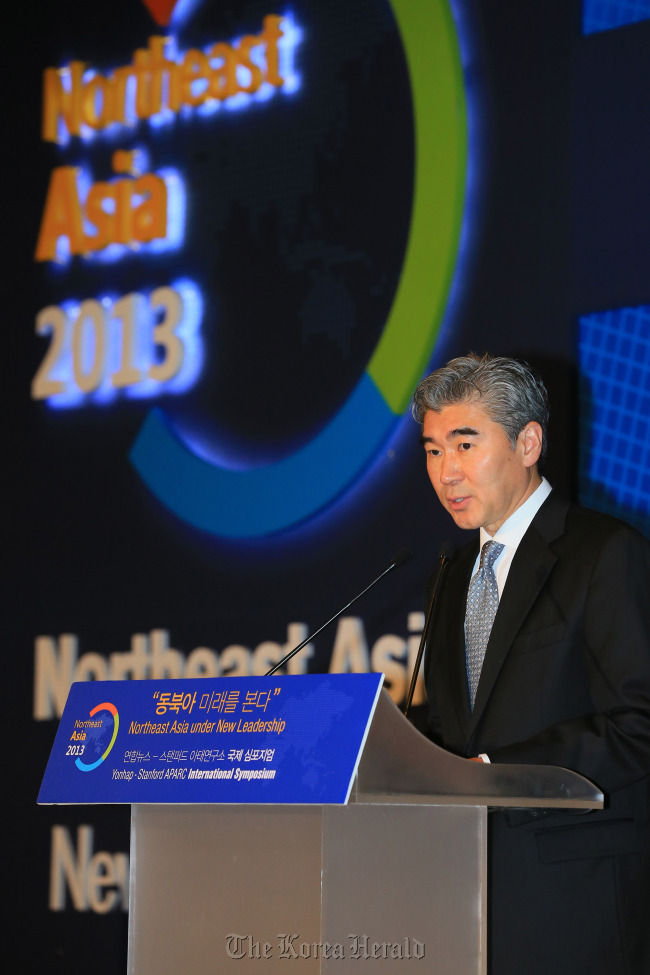U.S. envoy urges N.K. to return to diplomatic process
By Korea HeraldPublished : Feb. 11, 2013 - 20:24
United States Ambassador Sung Kim said North Korea must avoid a provocative nuclear test and return to an “authentic and credible diplomatic process” in opening remarks that also underscored this year’s 60th anniversary of the U.S.-Korean Defense Treaty at an international conference in Seoul on Tuesday.
“(North Korea) has raised a series of requests from the international community ranging from a peace treaty, to normalization of relations, to lifting economic sanctions. Our consistent position has been that we can discuss all of these issues, but we need to see progress on the nuclear issue first,” Kim said. “It is difficult to imagine a durable and lasting peace on the peninsula while the DPRK retains a nuclear capability.”
“(North Korea) has raised a series of requests from the international community ranging from a peace treaty, to normalization of relations, to lifting economic sanctions. Our consistent position has been that we can discuss all of these issues, but we need to see progress on the nuclear issue first,” Kim said. “It is difficult to imagine a durable and lasting peace on the peninsula while the DPRK retains a nuclear capability.”

Although dozens of conferences take place in Seoul every year focused on security and North Korea, this one stood out for the high-profile featured speakers.
A slew of old Korea hands, high-level politicians and diplomats descended on a hotel in downtown Seoul, amid an unprecedented leadership change in all six nations involved in the currently defunct six-party talks ― China, Russia, North Korea, Japan, the U.S. and South Korea. The international security confab took place after North Korea’s missile launch in December, South Korea’s launch in January and two weeks before the presidential inauguration of Park Geun-hye.
U.S. participants included Michael Armacost, the former U.S. ambassador to Japan and deputy secretary of state; Thomas Fingar, the former chairman of the National Intelligence Council; and scientist Siegfried Hecker, who was shown North Korea’s modern uranium enrichment facility during a visit to the country in 2011.
On the South Korean side, two former foreign ministers, Yu Myung-hwan and Yoon Young-kwan, participated as well as Rep. Shim Yoon-joe of the Saenuri Party.
The keynote speech was delivered by William Perry, who headed the U.S. Defense Department in the Clinton administration and spearheaded U.S. policy toward North Korea in the 1990s during the so-called “first North Korean nuclear crisis.”
The forum was organized by South Korea’s Yonhap News Agency and the Shorenstein Asia-Pacific Research Center at Stanford University.
The U.S. ambassador also underscored the U.S. Korea Defense Treaty and close ties between the two nations.
“We already work together to coordinate development assistance to enhance its effectiveness in the Lower Mekong, cooperate on counter-terrorism in Afghanistan, contribute to peacekeeping in Haiti and Lebanon, and even address piracy off the coast of Somalia. It’s a truly global partnership,” he said.
“However, the root of the alliance remains the defense and security of the Republic of Korea ― a commitment that the United States takes very seriously.”
By Philip Iglauer (ephilip2011@heraldcorp.com)
-
Articles by Korea Herald




















